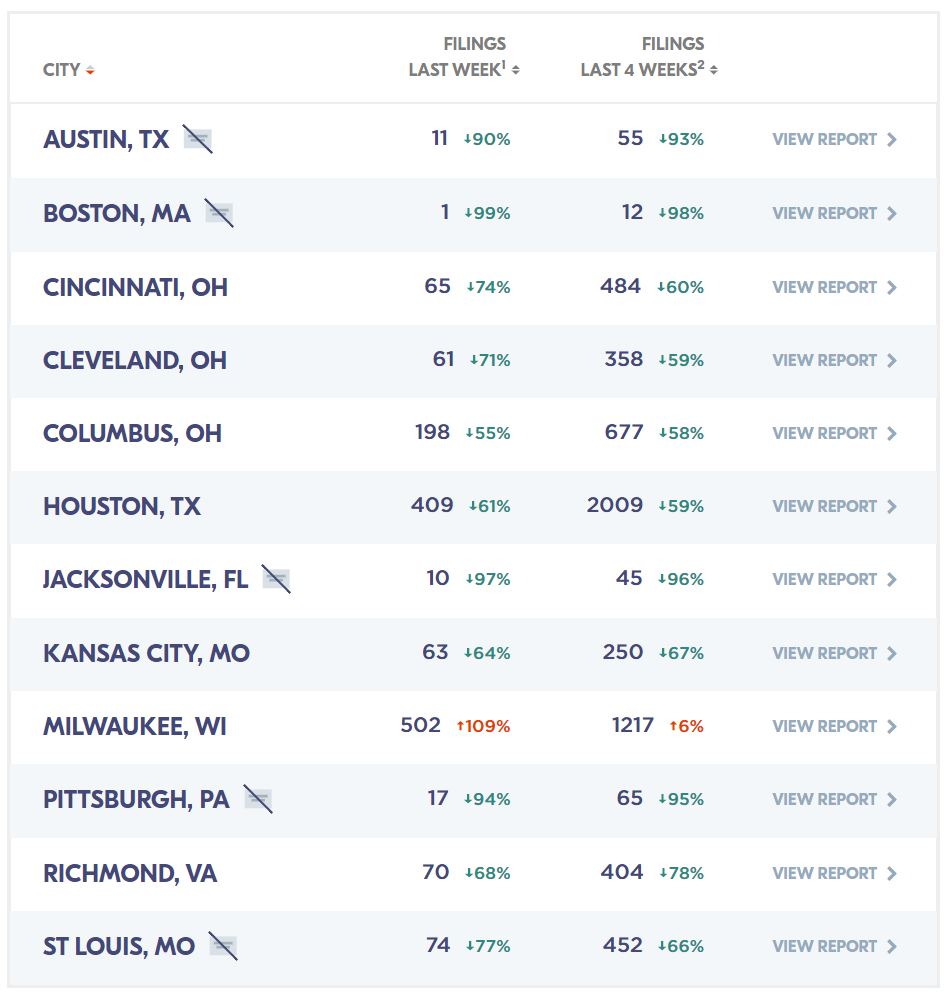The #EvictionTsunami hype is getting even louder. Before making policy, we need a sober understanding of what's really going on in housing markets. Spoiler: it probably won't be an eviction tsunami.
First off, being evicted is very unpleasant and has some negative consequences in the future (although they're small compared to the sorts of struggles that lead to potential eviction: https://www.nber.org/papers/w26139 ). Anyone facing eviction over unpaid rent has my sympathy.
As a factual matter, there are some key pieces of evidence that we are not in the calm before an eviction storm.
(1) Evictions did not rise during the Great Recession despite high unemployment, many foreclosures, and less financial support than today.
https://evictionlab.org/national-estimates/
(1) Evictions did not rise during the Great Recession despite high unemployment, many foreclosures, and less financial support than today.
https://evictionlab.org/national-estimates/
(2) Many states and cities removed eviction bans in May or June but haven't seen any spike. Among 12 cities tracked by @evictionlab, only Milwaukee is back to its pre-COVID level of evicting. Even in Milwaukee, there's been no 'make-up' surge.
https://evictionlab.org/eviction-tracking/
https://evictionlab.org/eviction-tracking/
(To be fair: the federal moratorium covered a substantial minority of renters in all cities until the last week of Eviction Lab's tracking data, so this could change, but we're not seeing anything like what you'd expect if a 'tsunami' were brewing.)
(3) Court systems are not set up to handle surges and many states are smartly prioritizing non-fiscal evictions (nuisance, property damage, etc). Many tenants, of course, will simply leave when asked, but a real tsunami would overwhelm the courts and thus slow itself down.
(4) Landlord data show that tenants have done quite well at paying rent, which is no surprise given that low-income people who lost jobs made more money on Unemployment Insurance.
https://www.nmhc.org/research-insight/nmhc-rent-payment-tracker/
https://www.nmhc.org/research-insight/nmhc-rent-payment-tracker/
(The bonus-UI just expired, but both parties want to extend it in some form, and regular UI is still in place. If nothing passes Congress, I'd expect more rent-payment trouble September 1st, but the big picture is there's no big build-up in missed rent.)
(5) The main evidence in favor of a lurking tsunami is decontextualized data from the experimental Census Household Pulse survey. The Pulse survey is noisy enough that the number of rental households jumps around by millions of households a month.
At the state level, even in big states, the Pulse can lose or add 20% to the renter population from *week to week* despite very small sampling errors. We know that's not happening. Ergo, the nonsampling error must be large.
Despite the large nonsampling error, the @uscensusbureau Pulse survey shows a consistent 25% of households that are 'housing insecure'. (The colored bars show weeks of the survey - it started April 23). https://www.census.gov/data-tools/demo/hhp/#/
These data aren't consistent with the narrative that "renters were OK through June, but conditions have taken a dramatic turn for the worse in recent weeks" which would explain away the Eviction Lab tracking data.
The Pulse is helpful, and I'm glad Census is doing it. But with vague survey questions (what does it mean to have "slight confidence"?), we look at changes, not levels. Pulse is only 12 weeks old, so there isn't much of a benchmark nor enough change to be very useful yet.
(6) Finally, think about the eviction problem from the landlord's perspective. She doesn't want a building full of vacant units in a potential market for lemons, right? The vast majority of nonpayment cases are resolved through late payment, forgiveness, or negotiation.
THAT is where local governments (and @HUDgov) should focus their resources. https://www.mercatus.org/publications/covid-19-economic-recovery/when-moratorium-expires-three-quick-steps-reduce-eviction
The easiest step is to publish model lease amendments so a landlord-tenant pair can fill in the blanks and get their renegotiated arrangement in writing, which protects everyone. Cities should promote this as a positive norm and facilitate where needed.
My policy brief has other ideas - prioritizing non-financial evictions in the courts, incentivizing rent forgiveness with rental assistance funds or regulatory incentives. https://www.mercatus.org/publications/covid-19-economic-recovery/when-moratorium-expires-three-quick-steps-reduce-eviction
A widespread eviction moratorium puts an unrealistic burden on those who provide rental housing. What do you think would happen to farmers if we decreed that food is essential (it is) and must therefore be provided on a pay-what-you-want basis for a year?
A yearlong moratorium would encourage some employed renters to live rent-free and walk away at the end of the year. Other renters would persist in creating nuisances and dangers for their neighbors. A long moratorium arises from an inaccurate mental model on renting.
Good policy, by contrast, will naturally flow from a correct understanding of what usually happens when a tenant can't make rent: they muddle through.
Let's all muddle through together. </Fin>
Let's all muddle through together. </Fin>

 Read on Twitter
Read on Twitter





